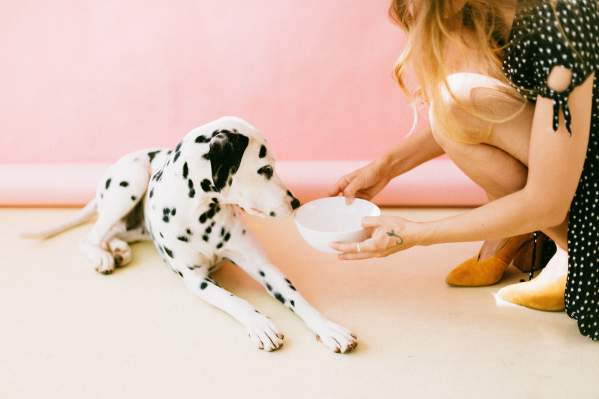When your dog is not eating, this can be very stressful for you as a pet parent. Finding the cause for this can be quite tricky, but it's important to get to the bottom of it so you know how to get your pup eating again.
There are a lot of potential reasons why your dog won't eat, and they can be broadly grouped into three categories: a physical issue with your dog, a behavioral issue, and a problem with the food itself.
For each potential cause, we'll look at associated symptoms and recommended treatments.
Reasons why your dog is not eating
Physical causes
Physical causes and illness are a common reason for a poor or even no appetite. Some dogs will display this as the only symptom of their illness, but often there will be other symptoms visible as well.
These symptoms will vary according to the cause, but can include things like pain or discomfort when chewing, bleeding or a foul odor from the mouth, vomiting, diarrhea, weight loss, pain, and lethargy, to name a few. It's very important to look for any other symptoms when your dog is not eating, as it might give you an indication of whether your dog is ill and needs to see a vet.
Here are a few things you can try to figure out if a physical issue may be the cause:
Try to feed them something else. In the absence of any other symptoms, you can also try to feed your dog a treat to see if they will eat something other than their normal food. If they're willing to eat something else, test more than one type of food. For example, if your dog will eat soft treats, but no hard treats, there might be an issue with a painful mouth or tooth. It's also a good idea to make sure they keep eating the treats, as some ill dogs will continue eating treats for a while before refusing anything at all. If your dog absolutely refuses to eat treats they usually devour, it's best to take your pup to the vet for a clinical examination.
Evaluate water intake. Water intake is also a good indicator of what might be going on. A dog that stops drinking in addition to not eating will need to get to a vet sooner than a dog that is still drinking water. Excessive water intake can also be an indicator of things like fever, pain, endocrine, and metabolic issues.
What you can do to help
Ultimately, any dog that goes without food for more than 24-48 hours without any identifiable cause or that has any other concurrent symptoms needs to be examined by a veterinarian. If your dog is not eating because they are physically not well, the cause needs to be identified and treated by your vet before they will start eating properly again.
Behavioral causes
In the absence of any other physical symptoms of disease, it's possible your dog’s refusal to eat could be a behavioral issue. It's important for you to try to act as calmly and naturally as possible while you are just observing their behavior. Look for any changes from their normal behavioral pattern. Examples of this include:
Are they hiding away or interacting less than usual?
Do they seem more aggressive towards housemates?
Do they seem depressed or bored?
Do they look anxious?
Will they eat treats, or eat if they are hand fed?
Another thing to consider is whether or not there have been changes in and around the house. Changes inside and outside the home might seem minimal to us, but can sometimes be a source of anxiety for your dog. Building work, loud noises, new neighbors, redecorating, a change in routine, a new pet, or even a new human in the house can be triggers for anxiety and stress and sometimes cause your pup to go off their food.
What you can do to help
If the reason your dog is not eating seems to be a behavioral problem due to stress or anxiety, there are some steps you can follow to try to get them to eat better.
Stick to a routine. It's important to try to stick to a feeding routine so your dog knows when they can expect their meal. This will help reduce stress for anxious dogs.
Regular exercise. Taking your dog for regular walks or allowing them to run around your garden or a park can help to reduce stress and anxiety and improve their appetite. Remember not to take your dog for a run straight after eating, as it has been associated with stomach torsion.
Reduce treats. Your dog’s refusal to eat their normal food might be a result of too many treats. This can either lead to your pup simply being overfed and not hungry, or to them learning that if they do not eat their food, they will likely get something tastier. Reducing the amount of treats they eat throughout the day might be enough to bring their appetite back and get them eating normally again.
Add a food topper or try a different food. Some dogs are simply picky eaters, and in these cases, adding a topper to the food can help motivate them to eat. Options for toppers are no-sodium broths, boiled white meat chicken, fish, lean beef, or some commercial wet food they like. You can also try to warm the food gently by placing it in the microwave for a few seconds or adding some warm water (just make sure to test the temperature before offering it to your pet). Simply trying a different brand or a different flavor of the same brand might also be enough to stimulate your dog’s appetite. Remember to make any food changes gradually over a few days to prevent an upset gut.
Puzzle feeders. Dogs need mental stimulation as much as humans do, so if you think your dog might be bored, using a puzzle feeder might be a good idea to get them interested in their food again.
Hand feed your pet. In extreme cases, especially for very anxious dogs, it might help to hand feed them for a few days. This is helpful in cases where there has been a change in circumstances and your dog just needs some time to adjust. It might also be of help just to sit with them to allow them to eat while you are close to them.
Food-related causes
It's worth looking at the food itself as a possible cause for your dog not wanting to eat. Examine the food closely for any signs of mold or rancid smells. You can also look at the color of the food to see if it is the same as previous bags or tins you might have used. If you have more than one dog in the house suddenly refusing the food or you find your dog avoiding their food bowl after you open a new pack or tin, it could also be more likely for the food to be a potential issue.
Food manufacturers sometimes make small changes to the product or they might start sourcing ingredients from a different supplier. Very sensitive dogs might need some time to adjust in case of even a small change to the flavor of the food.
Your dog’s food bowl can also potentially be a cause for them refusing the food, especially if you have switched to a new bowl recently.
What you can do to help
Check the expiry dates on the dog food.
Store dry dog food in an airtight container in a cool, dry area. Too much heat can cause the food to become rancid.
Store tinned food in the refrigerator for no more than 2-3 days once it has been opened. Make sure the food container is sealed with an air-tight lid or cling film.
If possible, open a new bag of food to see if your dog will eat the food from another pack.
Make sure food bowls are always clean and try to get a similar bowl if you have to change food bowls for your dog.
It can sometimes be tricky to figure out why your dog is not eating. Our pros at Pawp can give you some guidance to help you decide the best next step.

Reviewed and fact-checked by
Dr. Mari, DVM at Pawp
